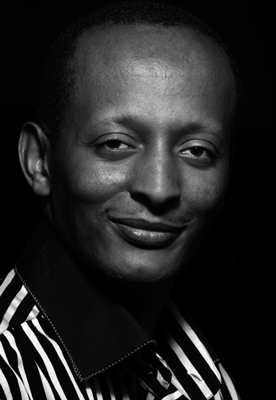
Eric Kabera
Rwandan filmmaker Eric Kabera will travel from Hillywood (Rwanda’s burgeoning film industry named after the country’s famously hilly landscape) to Hollywood to help judge this year’s Student Voices Short Film Contest.
Kabera, who has a background in radio journalism, is the founder and CEO of Kwetu Film Institute – Rwanda’s first film school. His directing and producing credits include 100 Days (2001), the first internationally-acclaimed film about the Rwandan Tutsi Genocide; the documentary Keepers of Memory (2004),about the men and women who watch over Rwanda’s sacred burial sites, and Africa United (2010), about three Rwandan kids’ quest to attend the World Cup in South Africa.
He appears in the documentary Finding Hillywood (2013), about the birth of the Rwandan film industry, and is directing the upcoming Intore, about how Rwandans use music and dance to heal from genocide.
Student Voices asks USC students to create short films that incorporate testimony from USC Shoah Foundation’s Visual History Archive, inspired by one of this year’s three themes: Preserving Humanity: Assistance and Resistance; Renewing Rwanda: The Genocide and After; and Risking Everything: Ordinary People, Extraordinary Actions.
Kabera will join his fellow jurors – independent filmmaker Sam Kadi, USC School of Cinematic Arts’ Michael Renov and Holly Willis, and last year’s Student Voices winner Cecilia De Jesus – to choose Student Voices’ winning film.
The finalists’ films will be presented and the winner will be announced at a screening and panel discussion with the jury Thurs., March 6 at the USC School of Cinematic Arts, room 106, at 7 p.m.
The following day, Kabera will screen Keepers of Memory and participate in a Q&A in USC’s Leavey Library Auditorium at 1:30 p.m. On Tues., March 11, he will present Finding Hillywood at the USC School of Cinematic Arts' Ray Stark Theatre at 7 p.m.
Kabera’s connection to the USC Shoah Foundation goes back many years, as he was involved in USC Shoah Foundation’s early efforts to collect and preserve testimony of survivors of the Rwandan Tutsi Genocide. He said seeing how far the collection has come since then – with the partnership of Kigali Genocide Memorial, 65 testimonies are now fully integrated in the Visual History Archive – is “a dream come true.”
Kabera has also had plenty of experience working with student filmmakers about genocide – almost all of the students at Kwetu Film Institute make films about the Rwandan Tutsi Genocide, he said.
“The story of genocide is always around. It’s fresh in their minds and experiences,” Kabera said. “But we try to advise them so their stories are accessible to the community and anyone outside Rwanda.”
In Rwanda especially, he added, it’s important for filmmakers to be sensitive to the audience so that the films don’t traumatize them – but because testimonies of survivors are so haunting, this can be a difficult task.
Film as a medium has the power to be uplifting, empowering, and allow people to experience something they otherwise wouldn’t be able to, he said. For him, subtlety is a key ingredient in films that deal with genocide or incorporate testimony.
“Simplicity speaks volumes to me – keeping things simple and poetic,” he said.